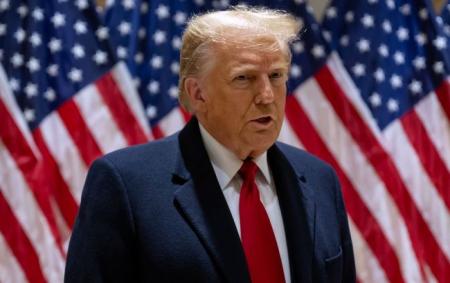
RBC-Ukraine discusses the parameters of peace settlement that both Trump and his key advisors have already outlined. This information is reported by Kontrakty.UA.
Throughout his election campaign and in the initial weeks following his electoral victory, Donald Trump spoke very vaguely about most global political issues, particularly regarding Ukraine. However, this trend is gradually diminishing as his team develops a clearer vision and assigns roles for various areas. On December 16, Trump held his first press conference after winning the election. Additionally, several interviews with Trump and his advisors have appeared in American media.
What Donald Trump Says
During the press conference, Trump stated that both leaders – Ukrainian President Volodymyr Zelensky and Russian dictator Vladimir Putin – "must be ready for a deal." The politician plans to negotiate with both of them.
"This needs to end. And we are trying to put an end to it. But we will see. We will talk to President Putin and to Zelensky, representatives of Ukraine. We must stop this. It is a bloody slaughter," he added.
Moreover, the elected U.S. president emphasized that a "deal" is needed to conclude the war between Russia and Ukraine. However, he did not specify what kind of deal he would like to arrange between the countries or whether he expects Ukraine to cede territory to Russia.
In an interview with Time published on December 12, Trump stated that he would prefer not to disclose the details of his plan to avoid undermining it.
"When I talk to people, when I start, I think I have a very good plan for assistance, but when I start to reveal this plan, it becomes almost an insignificant plan," the politician said.
In response to a question about whether Trump would abandon Ukraine, he said: "I want to reach an agreement, and the only way to reach an agreement is not to leave (Ukraine – ed.)."
At the same time, Trump stated in the interview that he is against allowing strikes deep into Russia.
"I strongly disagree with launching rockets hundreds of miles into Russian territory. Why are we doing this? We are only escalating this war and making it worse. This should not have been allowed. Now they are dealing not only with rockets but also with other types of weapons. And I think this is a very big mistake," Trump said.
Additionally, the future U.S. president would like to meet "quickly" with Russian dictator Vladimir Putin – again, to "stop the war." Earlier, several Western media outlets reported that a phone call had already taken place between Trump and Putin. The Kremlin categorically denies this, and Trump does not provide a clear answer on whether it is true.
What Kit Kellogg Says
In early January, the future U.S. special representative for Ukraine and Russia, Kit Kellogg, is expected to visit Ukraine. In an interview with Fox Business on December 13, he stated that Ukraine and Russia are ready for negotiations.
"Absolutely, I think both sides are ready. Imagine a cage fight. Both fighters are ready to give up. You need a referee to separate them. And I think President Trump can do that," Kellogg said.
According to his assessments, a war of attrition is currently taking place. The ratio of losses between Ukraine and Russia is approximately 1 to 5.
Kellogg noted that he would not be surprised if Trump does something similar by inviting Zelensky and Putin to Washington.
"You know, Trump plays chess on three levels, and I wouldn't be surprised if he does something like that. Can he do it? Of course, he could do it," Kellogg stated.
He added that the idea of such a meeting is "really very good."
"So I would say that I wouldn't rule anything out as possible, that he would do this, and it wouldn’t surprise me," Kellogg emphasized.
What Mike Waltz Says
On December 15, future national security advisor to Trump, Mike Waltz, responded to CBS News regarding whether Trump's team plans to limit Ukraine's use of American weapons or assistance in targeting, stating:
"President Trump said in an interview that an 'open check' is not a strategy," Waltz noted.
At the same time, the Financial Times reports that Trump intends to continue providing military assistance to Ukraine, according to three unnamed sources.
According to the publication, in early December, high-ranking British officials visited Washington to learn about Trump's plans regarding Ukraine. After the visit, they reported that the elected U.S. president is against Ukraine's NATO membership, but he believes that supplying weapons to Kyiv after a ceasefire will ensure "peace through strength."
Waltz also indirectly confirmed that Hungarian Prime Minister Viktor Orban serves as a communicator between Trump and Putin.
When host Margaret Brennan repeatedly asked whether there was any message that Trump was trying to convey through Orban, he stated:
"I am not going to get into the details of these interactions. But it is clear that conversations are ongoing, and President Trump has made it clear that he wants to stop this war," Waltz summarized.
***
In Trump's team, there is a growing understanding that ending the war "in 24 hours" will be impossible. This seems to be happening as they receive detailed information from the intelligence community and communicate with leaders of other countries. Judging by the statements of Trump and his entourage, halting assistance to Ukraine at one point appears unlikely and serves more as an incentive for negotiations. However, there is still no cohesive vision on how to end the war.
It is worth noting that Joe Biden sharply intensified assistance to Ukraine in the final days of his presidency. Military aid packages for Ukraine were announced on December 2 and 13. However, according to The New York Times, U.S. leadership is unlikely to utilize the entire amount of $5.6 billion in military assistance to Ukraine before Donald Trump takes office.